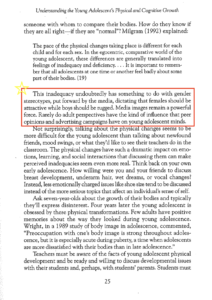Before continuing with this MVP response, I would like to plainly say that I haven’t taken a biology class since 9th grade and do not consider myself to be a scientist or expert on the human body. But, that being said, I do have one and think that that counts for something.
This particular article, when I read paragraph after paragraph regarding the physical and neurological changes all of our bodies go through during puberty, I couldn’t help but note how deeply engrained our perceptions, and reactions to them, are to prescribed gender roles.
How much of this is nature and how much of it is nurture? Will young boys that reach puberty later than others continue to (in general) have feelings of inferiority if they grow up in a society that doesn’t define masculinity largely on athletic ability, physical size and height, and penis size? Will young girls that develop earlier than others continue to (in general) feel self conscious about their bodies if they grow up in a society that doesn’t over sexualize young girls? How much of the blame for the pressure that children transition into is our collective fault for creating a society which actively and cyclically foments this?
I think social constructs regarding gender and gender roles still largely dictate MANY of the decisions and perspectives of adults. It’s not like we turn 20/21 and all of a sudden, toxic masculinity and sexism cease to affect our lived experiences.
Gender roles sometimes stick with us longer than puberty.

Side note and personal vendetta: Yet another article that lightly mentions that: “Researchers have noted that African American females reach puberty several months earlier on average than Caucasian females (Daniels et al. 1998).” (page 18), but provides no further information on the topic.